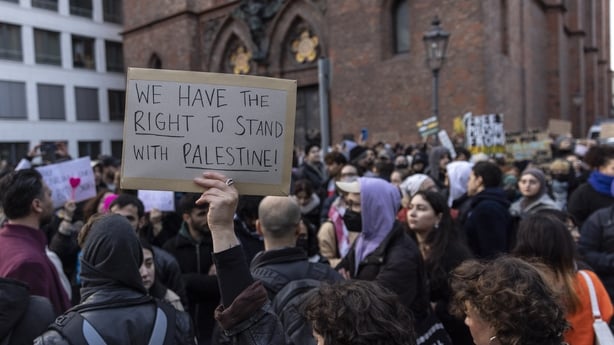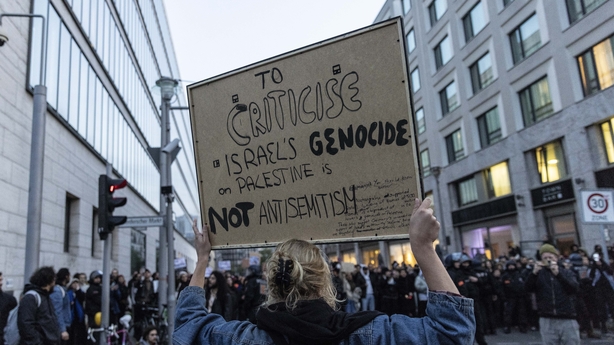Opinion: there's a tendency to hold up the German process of dealing with its past ('Vergangenheitsaufarbeitung') as a gold standard to emulate
By Laney Lenox, Ulster University
Germany is home to an estimated 100,000 Palestinians, one of the largest diaspora communities outside of the Middle East. Many of these people live in the Berlin district of Neukölln. As a resident of this district, I have witnessed the ongoing heavy police presence quelling public displays of support for Palestine. Germany and France, home to the European Union's largest Jewish and Muslim communities, have banned pro-Palestinian protests in the wake of the ongoing crisis, which has seen Israeli air and artillery strikes on Gaza following the October 7th assault on Israel by Hamas.
The German government and institutions often cite the Holocaust as the reason for an official position in support of the Israeli state and government. This position has, in its most recent iteration, resulted in a ban on many displays of solidarity with Palestine or gatherings expressing criticism of Israeli state policy. The effects of these bans have been felt by anti-Zionist Jews, Palestinian-Germans, and those wishing to mourn the dead, leading to concerns about democratic rights to freedom of assembly and protest in Germany.
We need your consent to load this rte-player contentWe use rte-player to manage extra content that can set cookies on your device and collect data about your activity. Please review their details and accept them to load the content.Manage Preferences
From RTÉ Radio 1's The Late Debate, a brief history of the conflict between Israel and Palestine
In the Spring 2023 issue of Jewish Currents, an editorial argues that policies surrounding this support of Israel shape the expression of both Jewish and Palestinian residents within Germany. This ironically results in a German national identity that is less dynamic and adaptable to an ever-changing German citizenry.
By drawing on its violent and anti-Semitic history to justify support of the current Israeli state, the German government makes an assumption that atoning for the past can be accomplished via a simple balancing of the scales. This atonement becomes a simple debt that can be paid in full, rather than an ongoing process of embedded memory work and societal conversation.
In my research, I argue that societies should adopt a non-linear approach to dealing with their histories that could encompass the present and be used as a tool to both imagine and build more socially just and inclusive futures. Dealing with the past in isolation runs the risk of overlooking or ignoring the ongoing colonial, imperial, and oppressive practices of the present and the implications for how our understandings of the past shape our futures.

I first moved to Berlin as part of this research, focusing on Germany's famous process of Vergangenheitsaufarbeitung: this translates to overcoming, or dealing with, the past and is used primarily to refer to the German reckoning with its Nazi past. The success of Vergangenheitsaufarbeitung in the long-term is dependent upon the channels of citizen participation in contending with history remaining open.
A petition created by Salah Said, a German citizen born and raised in Berlin by Palestinian parents, and Adam Broomberg, a Jewish resident of Germany, addresses the current ban on protests as a prohibition on democratic efforts to find peaceful and just societal solutions. This petition, which is still being circulated among German residents as well as within the international community, highlights the importance of peaceful dialogue and demonstration.

It is precisely this potential of ongoing dialogue regarding Germany’s difficult 20th century past that led to Vergangenheitsaufarbeitung’s international appeal and interest. Germany’s process of facing the past has given birth to academic theories, had references made to it in popular media and culture, and inspired calls for other nations to follow suit.
While some writers and thinkers (such as Michael Rothberg, Yasemin Yildiz, Esra Özyürek and Max Czollek) have criticised the German memorial process for not contending with the nuanced realities of current German society, there has been a tendency to hold up the German process of dealing with its past as a gold standard to emulate. For example, art historian and former director of the British Museum Neil MacGregor looks to Germany to argue that Britain should begin its own reflexive historical process.
From Deutsche Welle, Pro-Israel and pro-Palestinian rallies in Germany: Legal action against pro-Palestine bans?
Similarly, Susan Neiman discusses the potential of an American Vergangenheitsaufarbeitung in her 2019 book, Learning from the Germans. This idea became part of a wider national conversation in the US amid the Black Lives Matter protests of 2020. The German culture of remembering infused these American conversations about how to face the past with both a sense of frustration and hope: hope that a sense of reckoning and atonement was achievable and despair that the national conversation had gone on so long without it.
If German memory work is to be held as an international example for contending with past harms, it is crucial that this process remains a continuous and inclusive dialogue. As American writer Clint Smith argues in a piece for The Atlantic about Germany's remembering of its Nazi past, a nation's attempts at memorialising its dark past are powerful in and of themselves. However, as a non-linear approach to "dealing with" the past reveals, a nation’s history can never be separated from its present and attempts to dictate what that past should mean sway the direction of a nation’s future.
We need your consent to load this rte-player contentWe use rte-player to manage extra content that can set cookies on your device and collect data about your activity. Please review their details and accept them to load the content.Manage Preferences
From RTÉ Radio 1's Morning Ireland, preparation continues for Israel's expected ground invasion of Gaza
The German government is not alone in its ongoing assertion that criticism of the Israeli government is anti-Semitic. Echoes of this narrative exist in much of Western society, resulting in what often seems like unilateral support of a government accused of becoming increasingly right-wing and committing human rights violations in Gaza and other Palestinian territories.
The past weeks make evident that efforts to contend with history that result in top-down sanctions on citizens’ and residents’ ability to express their nuanced opinions are a threat to an inclusive and equitable democratic society. Allowing nuanced and diverse opinions to exist in open dialogue, as Said and Broomberg’s petition advocates for, creates stronger mechanisms for dealing with a nation’s history that ensure wider democratic participation.
Laney Lenox is a PhD researcher in the School of Applied Social and Policy Sciences at Ulster University
The views expressed here are those of the author and do not represent or reflect the views of RTÉ

